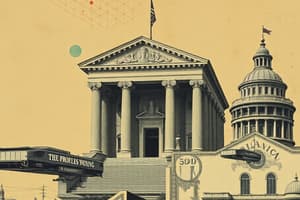Podcast
Questions and Answers
What is money?
What is money?
Anything that is generally accepted in payment for goods and services or to pay off debts.
What is the money supply?
What is the money supply?
The total quantity of money in the economy.
What are the primary sources of funds for a bank?
What are the primary sources of funds for a bank?
Deposits.
What is a balance sheet?
What is a balance sheet?
What does the equation Assets = Liabilities + Shareholders’ equity represent?
What does the equation Assets = Liabilities + Shareholders’ equity represent?
What is a liability?
What is a liability?
What is bank capital?
What is bank capital?
What happens to bond prices when interest rates increase?
What happens to bond prices when interest rates increase?
What is the goal of tax management in a corporate setting?
What is the goal of tax management in a corporate setting?
What is the foreign-exchange market?
What is the foreign-exchange market?
Where does most foreign-exchange trading take place?
Where does most foreign-exchange trading take place?
Flashcards are hidden until you start studying
Study Notes
Money
- Medium of exchange that is widely accepted for goods and services.
Money Supply
- Total amount of money in circulation within an economy.
Primary Sources of Funds for a Bank
- Deposits from customers
- Checking accounts
- Savings accounts
- Time deposits
- Borrowings from other institutions
- Federal Reserve
- Other banks
Balance Sheet
- Financial statement that summarizes a company's assets, liabilities, and shareholders’ equity at a specific point in time.
Assets = Liabilities + Shareholders’ Equity
- This equation represents the fundamental accounting equation, it shows that a company's assets must equal its liabilities plus the value it represents to its owners (shareholders).
Liability
- Financial obligation that a company must repay in the future.
Bank Capital
- The difference between a bank's assets and liabilities. It represents the bank's ownership stake.
Interest Rates and Bond Prices
- Bond prices and interest rates have an inverse relationship:
- When interest rates increase, bond prices decrease.
- When interest rates decrease, bond prices increase.
Tax Management Goals in a Corporate Setting
- To minimize tax liability legally and ethically.
- Tax avoidance strategies
- Tax planning
Foreign-Exchange Market
- Global marketplace where currencies are bought and sold.
Foreign-Exchange Trading Locations
- Most foreign-exchange trading takes place in:
- London
- New York
- Tokyo
Studying That Suits You
Use AI to generate personalized quizzes and flashcards to suit your learning preferences.




